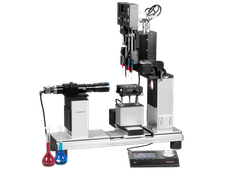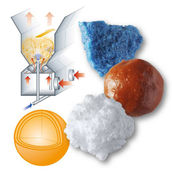AkzoNobel and partners awarded algae research funding
Advertisement
AkzoNobel is part of a Dutch consortium which has just received major funding to investigate the potential of converting algae into feedstock for the chemical industry. Having partnered with energy company Essent, algae producers Ingrepo and Wageningen University, the consortium has now received more than EUR1 million of government funding after successfully applying for a long-term energy research subsidy.
The four-year study will involve scientists at Wageningen conducting fundamental research into algal biology, growth parameter testing, separation and the subsequent upgrading of algae fractions. In addition, a pilot project will begin at AkzoNobel's Delfzijl site in order to scale up the processes. Factors that influence the economics of algae-based chemical building blocks algae will also be investigated.
"With the Earth's natural resources running out it's becoming increasingly important to look for more sustainable alternatives," explains Hans Feenstra, who has been making preparations for the project since last year. "Algae offers the possibility for us to create value from renewable feedstock. It grows at a prodigious rate, can be used to rebate C02 emissions and has the potential to treat waste water streams. There are also no concerns regarding the food versus energy biomass debate."
He adds that the planned Delfzijl demonstration unit is expected to be up and running by September. Consisting of two, 1,000 square meter ponds linked to the site's cogeneration unit, it will be used to test conditions and methods for growing algae (there are more than 80,000 known types) on a larger scale in an industrial environment. "It will be a good opportunity for us to familiarize ourselves with bio-based processes," notes Feenstra.
The concept of creating value by obtaining certain fractions from renewable feedstock has been christened biorefinery. In the case of algae, it has been identified as having the potential to provide a rich source of unsaturated fatty acids, proteins and polysaccharides - all of which have important links to the chemical industry. Already creating enthusiasm because of what it can offer to the bio-fuel industry and power producers, algae could also have higher end value as a source of raw materials for coatings.
Most read news
Topics
Organizations
Other news from the department science
These products might interest you

Dursan by SilcoTek
Innovative coating revolutionizes LC analysis
Stainless steel components with the performance of PEEK - inert, robust and cost-effective

OCA 200 by DataPhysics
Using contact angle meter to comprehensively characterise wetting behaviour, solids, and liquids
With its intuitive software and as a modular system, the OCA 200 answers to all customers’ needs

Tailor-made products for specific applications by IPC Process Center
Granulates and pellets - we develop and manufacture the perfect solution for you
Agglomeration of powders, pelletising of powders and fluids, coating with melts and polymers

Get the chemical industry in your inbox
By submitting this form you agree that LUMITOS AG will send you the newsletter(s) selected above by email. Your data will not be passed on to third parties. Your data will be stored and processed in accordance with our data protection regulations. LUMITOS may contact you by email for the purpose of advertising or market and opinion surveys. You can revoke your consent at any time without giving reasons to LUMITOS AG, Ernst-Augustin-Str. 2, 12489 Berlin, Germany or by e-mail at revoke@lumitos.com with effect for the future. In addition, each email contains a link to unsubscribe from the corresponding newsletter.































































